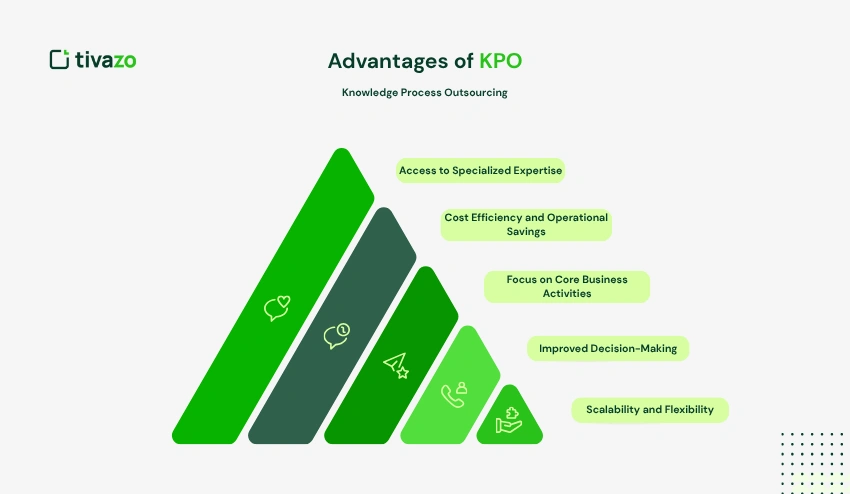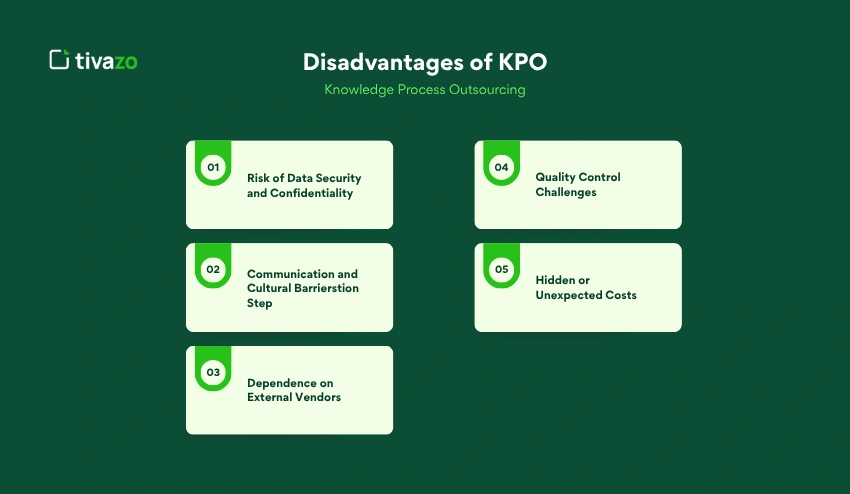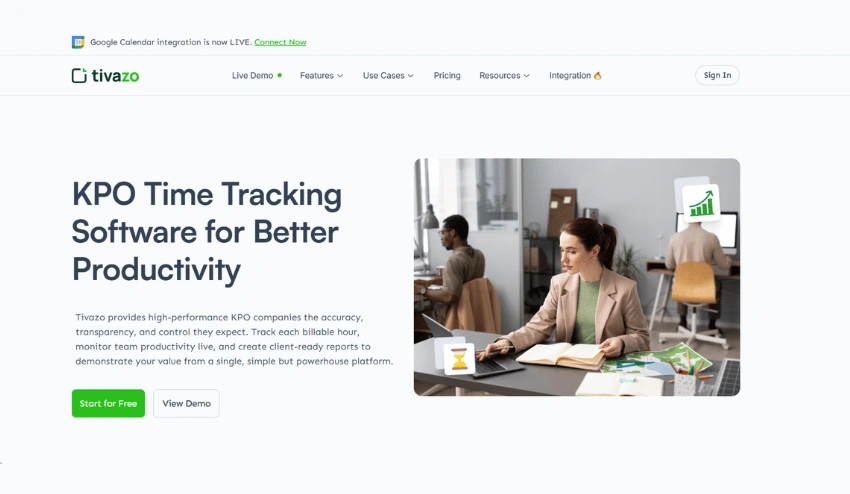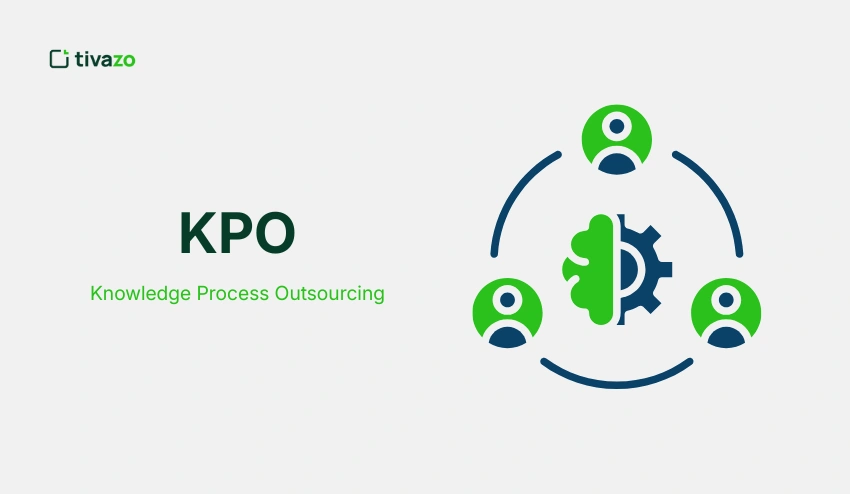What is KPO?
KPO (Knowledge Process Outsourcing) is the practice of outsourcing knowledge-based and analytical tasks to specialized external providers. Unlike traditional BPO, which handles routine or administrative work, KPO focuses on high-value processes that require expertise, such as data analysis, market research, legal services, financial consulting, and business intelligence.
By using KPO, businesses are able to access talented workers, save on operational expenses, and make better decisions using data-driven information. It helps businesses concentrate on their core strategies and use external experience in complex and knowledge-intensive operations.
What skills do KPO jobs require?
KPO jobs require an integration of technical, analytical, and communication abilities to deal with complex knowledge-based tasks. The domain specialists are supposed to think, analyze data, and provide insight that will assist in making business decisions.
Key skills required for KPO jobs include:
- Strong analytical and research skills for interpreting data and market trends.
- Domain expertise in areas like finance, law, IT, healthcare, or marketing.
- Advanced proficiency in tools such as Excel, SQL, Power BI, or data visualization software.
- Excellent written and verbal communication skills to present findings clearly.
- Attention to detail and problem-solving abilities for accuracy and innovation.
These skills enable KPO professionals to add strategic value, enhance productivity, and contribute to a company’s overall growth.
Types of KPO
The KPO industry provides a great variety of specialized services in different fields. All forms of KPO target particular knowledge-based activities that require experience, analytical skill, and familiarity. Below are the major types of KPO and their key roles in driving business growth.

1. Financial Process Outsourcing
Financial Process Outsourcing (FPO) refers to strategies of outsourcing complex financial and accounting processes to dedicated teams. These services are financial analysis, risk management, investment research, budgeting, and forecasting. FPO helps businesses remain accurate, compliant, and make decisions based on data.
Outsourcing financial processes gives business organizations access to qualified analysts and high-quality financial instruments at a relatively low cost compared to having an internal team. This assists in enhancing profitability, ease in reporting, as well as upholding compliance in regulations, as well as concentrating on the strategic business operations.
2. Legal Process Outsourcing (LPO)
Legal Process outsourcing includes legal research, document review, contract management, and intellectual property (IP) outsourcing. LPO providers are used in law firms and corporate legal departments to save time in performing some critical yet time-consuming legal tasks.
By outsourcing these services, the businesses are able to save money, increase turnaround time, and have the benefit of international legal advice. It also allows in-house staff to be able to concentrate on strategic legal work, client relationships, and case development, and maintain high accuracy and compliance standards.
3. Research and Analytics Outsourcing
Research and analytics KPO concentrates on collecting, analyzing, and reporting data intelligence to business strategy and market intelligence. It involves market research, consumer behavior analysis, data mining, as well as performance forecasting.
These services enable organizations to make effective decisions, explore areas of growth, and increase their competitive advantage. Companies are able to streamline the marketing process, product development, and general business planning with the insights provided by the specialized KPO with data.
4. Healthcare and Pharmaceutical KPO
KPO in healthcare and pharmaceutical entails the administration of clinical information, medical billing, research records, and regulatory oversight. It is also engaged in pharmaceutical research, drug development support, and medical content creation.
Healthcare organizations will be able to enhance the efficiency of their operations, guarantee the accuracy of their data, and satisfy the demands of rigorous compliance with the use of KPO partners. This outsourcing enables the lessening of the administrative load and enables the professionals to concentrate on the treatment of patients and medical research.
5. Engineering and Design KPO
KPO Engineering and Design offers skills in technical documentation, simulation, product development, and CAD design. These services are utilized by firms in the manufacturing, construction, and automotive industries to seek special design assistance.
This kind of KPO helps businesses to reduce design cycle, enhance quality, and access an international pool of talent. It also leads towards innovation and cost-effectiveness by exploiting high-tech tools and highly qualified personnel in special engineering areas.
👉You May Also Like: Agent Performance in BPO: 5 Powerful Reasons to Boost
What are the advantages of KPO?
Knowledge Process Outsourcing (KPO) has a lot of advantages that extend beyond cost reduction. It helps organizations to utilize professional expertise, enhance decision-making, and productivity. The following are the best KPO benefits that can make businesses remain competitive in the marketplace that is data-driven marketplace.

1. Access to Specialized Expertise
Access to highly qualified professionals with specific expertise in the domain is one of the greatest benefits of KPO. Be it in the financial, legal, research, or engineering field, KPO firms hire experts who inject expertise and experience in each undertaking.
The access will guarantee quality results, enhanced accuracy, and innovative solutions that might not be in-house. These professionals can be trusted by businesses with the complex work that can be performed effectively and at the same time comply with the global norms.
2. Cost Efficiency and Operational Savings
KPO enables companies to save a lot of money by offloading knowledge-intensive jobs to other countries where there is a low cost of labor but a high talent supply. This assists companies in reducing their manpower costs, training expenses, and infrastructure.
Meanwhile, outsourcing is effective in enhancing efficiency as it helps teams to concentrate on strategic activities rather than on routine tasks. The outcome is improved allocation of resources and enhanced profitability without having to compromise service quality.
3. Focus on Core Business Activities
Through outsourcing non-core yet important processes, organizations are in a position to concentrate on their core business objectives and strategic areas of growth. KPO providers also deal with research, analytics, etc., and internal teams can work on innovation and customer engagement.
This change not only increases productivity but also improves decision-making and performance of the business. It enables the management to spend more time on strategy, product development, and competitive positioning.
4. Improved Decision-Making Through Data Insights
KPO firms deal with data analysis, market research, and forecasting- they are able to give valuable insights that can be used to make informed decisions. Availability of real-time analytics helps businesses react swiftly to changes and the new opportunities in the market.
Using data-driven strategies, companies are able to do better marketing campaigns, make investments optimally, and achieve customer satisfaction. This analytical advantage is one of the most powerful factors why KPO is turning into a staple of modern business activities.
5. Scalability and Flexibility
The other significant strength of KPO is its flexibility. Operations may be scaled up or down by the businesses according to the workload, size of the project, or seasonal demand. This provides cost control and agility of operation without impacting productivity.
KPO providers also provide tailored solutions that evolve with the changing business requirements, which enable businesses to remain resilient and competitive in dynamic market conditions. This scalability renders KPO a strategic asset in the long term to grow sustainably.
What are the disadvantages of KPO?
Although Knowledge Process Outsourcing (KPO) can be very strategic, it also has its challenges and threats. Companies need to know about such disadvantages in order to handle outsourcing successfully and retain quality and control. The following are the key drawbacks of KPO that an organization should take into account.

1. Risk of Data Security and Confidentiality
Data security is one of the largest issues in KPO. Outsourcing is associated with the sharing of sensitive business information, and every time, there is a risk of information breach, misuse, or unauthorized access.
In order to prevent this, the companies need to select KPO providers that have stringent data security policies, have a well-developed cybersecurity policy, and adhere to the international standards, including GDPR and ISO. It is also necessary to ensure legal agreements and confidentiality clauses as a way to ensure that business interests are not compromised.
2. Communication and Cultural Barriers
The collaboration with KPO providers in other countries may also result in communication challenges and cultural gaps. The language differences, time differences, and differences in work culture often lead to misunderstanding or delay of the project.
To do this, effective collaboration must have good channels of communication, frequent meetings, and cultural awareness training to overcome these gaps. The creation of a clear workflow can be used to maintain a clear picture and guarantee the quality of the desired output.
3. Dependence on External Vendors
In the event of outsourcing of critical knowledge processes, over-dependence on the service providers may occur. This dependency can cause problems should the supplier fail to deliver in time, be hampered due to some operational problems, or raise costs that are not expected.
A balanced strategy should be applied to business, maintaining internal expertise to a certain degree and monitoring the performance of the vendors closely. Reducing dependency and protecting continuity can be achieved through having alternative solutions or having more than one vendor.
4. Quality Control Challenges
Maintaining consistent quality standards across outsourced projects can be difficult. Differences in methodologies, tools, or quality benchmarks between the client and the KPO firm may lead to errors or inconsistencies in deliverables.
To address this, companies should establish clear quality metrics, performance KPIs, and regular review systems. Frequent audits and feedback sessions help ensure that the final output aligns with organizational standards and objectives.
5. Hidden or Unexpected Costs
Even though KPO could save on costs, there could be some costs that are not visible in the form of contract administration, coordination, training, or integration of technology. These unexpected costs can minimize the savings that would have been achieved through outsourcing.
Before collaborating with a KPO provider, it is important to have transparent contracts and an analysis of the costs. Constant review of project budgets helps in keeping the outsourcing cost-effective and in line with the business objectives.
👉You May Also Like: How do we calculate how many hours we work a week?
KPO vs BPO
Both KPO and BPO are different models of outsourcing, yet they are used for different purposes, and different degrees of expertise are needed. The knowledge of their differences assists businesses in selecting the appropriate outsourcing strategy.
| Feature | KPO (Knowledge Process Outsourcing) | BPO (Business Process Outsourcing) |
| Nature of Work | High-value, knowledge-intensive tasks | Routine, process-driven tasks |
| Skill Requirement | Requires domain expertise, analytical and technical skills | Requires basic operational or administrative skills |
| Examples | Market research, financial analysis, legal services, R&D | Call center support, payroll processing, data entry |
| Decision Impact | Directly supports strategic decision-making | Supports operational efficiency and cost reduction |
| Complexity | High – involves research, analysis, and problem-solving | Low – involves repetitive, rule-based tasks |
| Cost | Higher due to expertise and specialized resources | Lower due to standardized processes |
| Time Horizon | Long-term, knowledge-driven projects | Short-term, routine task execution |
| Innovation | Encourages innovation and data-driven insights | Limited innovation, focuses on standard procedures |
What is a KPO vs a KPI?
A KPO (Knowledge Process Outsourcing) is defined as the outsourcing of knowledge-intensive and specialized functions to other experts or companies. These activities are usually research, analysis, legal services, financial modelling, or other high-value work in the domain. KPO is dedicated to enhancing business performance through the use of talented professionals who share insights, evidence-based suggestions, and inventive solutions.
On the other hand, a KPI (Key Performance Indicator) is a quantifiable measure applied by companies to monitor and measure the effectiveness of certain set objectives or performance targets. KPIs refer to internal indicators, including revenues, customer satisfaction, project completion rates, and others, to determine efficiency, progress, and general performance. KPO is an outsourcing strategy of specialized tasks, whereas KPIs are measures and management tools of the effectiveness of the special tasks and other business processes.
Knowledge Process Outsourcing Companies
1. Genpact
With headquarters in New York, Genpact provides an extensive portfolio of knowledge process outsourcing services to the industries of banking, healthcare, retail, and manufacturing. Their specialties include analytics, finance and accounting, risk management, and end-to-end process change that assist clients in transforming data into actionable insights and enhancing decision-making.
2. Accenture plc
Accenture is a global professional services company based in more than 50 countries and offers KPO solutions such as research and insights, data analytics, strategy consulting, and knowledge services related to the industry. Their products cut across such markets as financial services, healthcare, technology, and energy, with advanced technology and knowledge of the domain.
3. WNS Global Services
WNS, based in Mumbai, provides KPO services, including market research, legal process outsourcing, procurement support, and analytics, especially to such industries as insurance, banking, travel, and retail. They integrate business knowledge and digital technology to facilitate decision-making and streamline business operations.
4. EXL Service Holdings, Inc.
EXL Service is a firm that specializes in the field of analytics, risk management, and operations services, which makes it a powerful competitor in the KPO industry. They are used in the industries of healthcare, insurance, banking, and utilities, and they assist organizations in deriving value out of their data and processes through insight-driven outsourcing.
5. eClerx Services Ltd
eClerx is a company based in India that provides KPO services related to financial operations, digital marketing analytics, data management, and content support. Their clients cut across industries such as financial services, retail, and digital media, and are interested in integrating domain expertise and efficiency in their operations.
Tivazo for KPO providers
Tivazo is an advanced time tracking and employee monitoring software that can significantly enhance the productivity and efficiency of KPO (Knowledge Process Outsourcing) providers. In the extremely specialized and knowledge-driven KPO industry, employee activity and billable hours management and accountability tracking are essential to the success of operations. Tivazo offers live data on the performance of teams, screen captures, active and idle time, and more detailed reports to ensure that managers at KPO can streamline their workflows and ensure quality output.
Using analytics and reporting capabilities provided by Tivazo, KPO firms will be able to quantify team productivity, determine bottlenecks, and simplify a complicated process like research, financial analysis, or market intelligence. Remote work and hybrid work models are also supported by the software, allowing geographically distributed teams to be managed by knowledge process outsourcing companies efficiently. Tivazo has such features as automated timesheets, productivity heatmaps, and performance dashboards that guarantee that all tasks, including data analysis and strategic consulting, are monitored correctly and transparently.

Conclusion
In conclusion, Knowledge Process Outsourcing (KPO) has become an effective approach that allows companies to find a tailor-made expertise, analytical data, and cost-effective operations. Through KPO, businesses are able to concentrate on their core business operations and leave the complex and high-value tasks like research, analytics, legal, and financial operations to the experienced professionals. Applications such as Tivazo also complement KPO activities as they offer real-time tracking of employees, time monitoring, productivity insights, accountability, transparency, and streamlined workflow to remote or distributed teams. With the KPO industry rapidly expanding, expert outsourcing coupled with the use of advanced management tools will enable organizations to have scalability, innovation, and sustainable competitive advantage in the current knowledge-based business environment.




